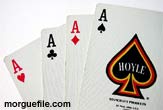Gamblers' Brains See 'Near Misses' as Wins

Get the world’s most fascinating discoveries delivered straight to your inbox.
You are now subscribed
Your newsletter sign-up was successful
Want to add more newsletters?

Delivered Daily
Daily Newsletter
Sign up for the latest discoveries, groundbreaking research and fascinating breakthroughs that impact you and the wider world direct to your inbox.

Once a week
Life's Little Mysteries
Feed your curiosity with an exclusive mystery every week, solved with science and delivered direct to your inbox before it's seen anywhere else.

Once a week
How It Works
Sign up to our free science & technology newsletter for your weekly fix of fascinating articles, quick quizzes, amazing images, and more

Delivered daily
Space.com Newsletter
Breaking space news, the latest updates on rocket launches, skywatching events and more!

Once a month
Watch This Space
Sign up to our monthly entertainment newsletter to keep up with all our coverage of the latest sci-fi and space movies, tv shows, games and books.

Once a week
Night Sky This Week
Discover this week's must-see night sky events, moon phases, and stunning astrophotos. Sign up for our skywatching newsletter and explore the universe with us!
Join the club
Get full access to premium articles, exclusive features and a growing list of member rewards.
Problem gamblers have a stronger response in the reward section of their brains to so-called "near misses" than do people who only gamble casually, a new study finds. The results might explain why gamblers have such a hard time pulling themselves away from the slots, the researchers say.
A near miss is a situation in which a gambler appears to have fallen just short of the jackpot, such as when the spinning slot machine wheels land on two cherries and a lemon. In reality, it is no different from a regular loss.
The findings add weight to the idea that gambling targets some of the same brain systems known to play a role in chemical addictions to drugs, according to study researcher Luke Clark of the University of Cambridge. Specifically, Clark suggests near misses activate the release of dopamine, a brain chemical involved in the reward response to everything from chocolate to cocaine.
"We know that all drugs of abuse target the dopamine system and that mechanism is thought to be crucial for the addictive properties of these drugs," Clark said. "[The finding] strengthens the links between problem gambling and drug addiction."
"Almost" a win
Previously, Clark and his colleagues showed that the brain area that responds to winning also responds to these near misses in people who only gamble occasionally. They were curious to see if this response might vary depending on the severity of a person's gambling problem.
They used functional magnetic resonance imaging (fMRI) to scan the brains of 20 individuals who played a computer game simulating slot machines. During the game, participants were given the chance to win real money, but, unknown to them, the most they could win was about $23.
Get the world’s most fascinating discoveries delivered straight to your inbox.
"Subjects who had more symptoms of problem gambling, gambling debts, family conflicts about gambling…showed a stronger response to near misses that was in a part of the brain that we know is very rich in dopamine," Clark said.
Treatment options
The results suggest certain forms of psychiatric and drug treatments might be useful for gambling problems, Clark said.
"It suggests that a form of cognitive therapy where we try and identify these beliefs about near misses and encourage the gambler to interpret these near misses in a more accurate way, that may be useful technique in psychotherapy," Clark told LiveScience.
"Drugs that target the dopamine system and aim to dampen these dopamine responses may be effective in treating problem gambling," he said.
More research is needed to verify the dopamine response is involved in reaction to near misses, since this study only identified the brain area, not the neuro-chemicals, involved. Also, future behavioral studies done in the real world could help to confirm near misses fuel gambling habits.
The research, which was published May 5 in the Journal of Neuroscience, was supported by the Medical Research Council and the Responsible Gambling Fund, among others.
- Top 5 Habits You Should Still Quit
- Understanding the 10 Most Destructive Human Behaviors
- Top 10 Things You Didn't Know About the Brain

Rachael is a Live Science contributor, and was a former channel editor and senior writer for Live Science between 2010 and 2022. She has a master's degree in journalism from New York University's Science, Health and Environmental Reporting Program. She also holds a B.S. in molecular biology and an M.S. in biology from the University of California, San Diego. Her work has appeared in Scienceline, The Washington Post and Scientific American.
 Live Science Plus
Live Science Plus










